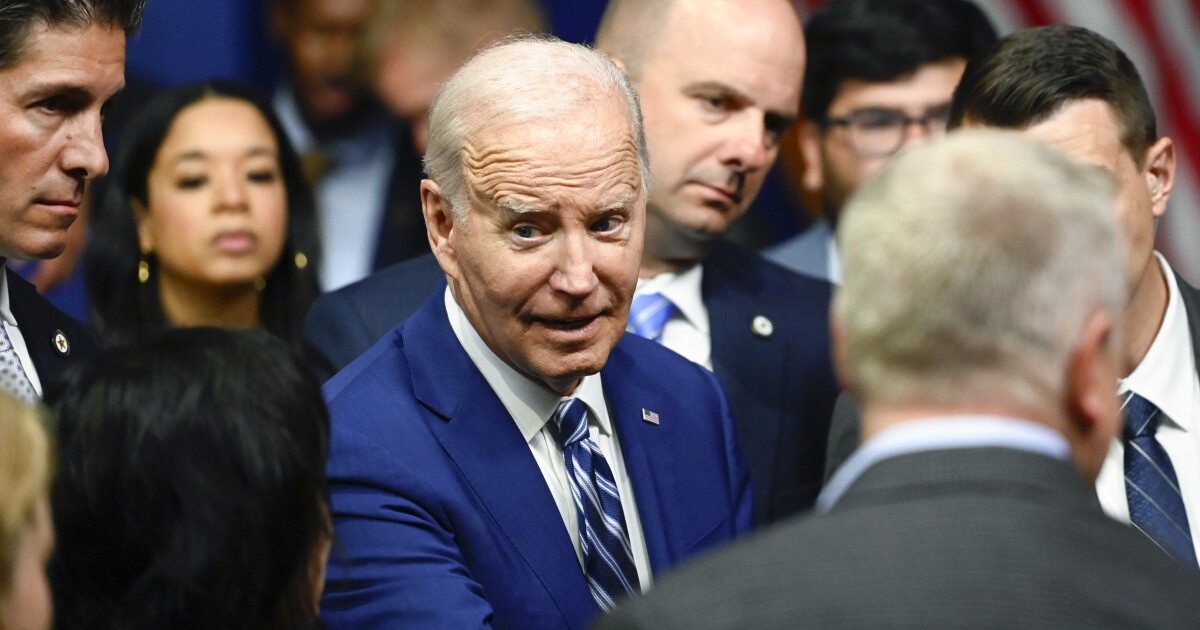

President Joe Biden‘s embrace of Bidenomics as a brand for his economic policy coincides with the first consumer price index reporting an increase in annualized inflation in a year.
But despite other positive economic indicators, the report exacerbates negative public opinion about Biden and the economy before next year’s election.
INFLATION TICKED UP TO 3.2% IN JULY IN SETBACK FOR BIDEN AND FED
In the battleground state of Pennsylvania, Berwood Yost, director of Franklin & Marshall’s Center for Opinion Research, underscored how public perception regarding the economy “takes time to move” because it is “so complex” and affects people in “different ways.”
“Even though inflation is slowing, they still experienced inflation over the past few years, and things are expensive, and probably their wages haven’t really kept up,” Yost told Washington Examiner. “It’s going to take some time for them to feel like they’re getting ahead again, and that’s part of what President Biden is up against.”
“That stuff is particularly noticeable to the kinds of voters that used to be Democrats that have left the party behind, particularly in rural communities,” he said. “They can move how people feel about things. … If he wants to get reelected, his job approval ratings in the state are going to have to start moving upward, and this is about the time when it happens.”
Biden won Pennsylvania by a percentage point or 81,000 votes in 2020, rebuilding Democrats’ blue wall, which also includes Michigan and Wisconsin. A June Quinnipiac University poll found former President Donald Trump was leading Biden by 1 point, 47% to 46%.
Arizona and Georgia, which Biden additionally won last cycle, are important to the president’s electoral map in case he cannot repeat his success with the blue wall.
For University of Georgia political science professor Charles Bullock, the concern with inflation is “the uncertainty it creates,” even if gas, for instance, has only increased by 30 cents a gallon during the last month.
“When people think about economics, they’re thinking about their own pocketbook,” he said. “My guess is if I were to go on a walk up and down the streets of Athens or Atlanta and ask people what they think about Bidenomics, they would probably give a lot of blank looks. I don’t think it’s baked into the vocabulary of the average Georgian.”
Consumer prices increased by 3.2% in July compared to a year ago, with core inflation, excluding food and energy, up 4.7% during the same period. Both measures rose by 0.2% on a monthly basis, driven largely by shelter costs. But although inflation has cooled since last summer and economic growth and employment data remain strong, it is still higher than the Federal Reserve‘s 2% target.
Biden’s inflation “crisis” continues to “wreak havoc” on the public, according to the Republican National Committee.
“More Americans are behind on credit cards, auto loans, and personal loans than at any time since 2009, while credit card debt is at an all-time high,” RNC spokesman Jake Schneider said. “Interest rates are at their highest in 22 years, and gas prices, which have only been higher since Biden took office, are surging.”
July’s consumer price index report similarly coincides with Biden’s tour of Arizona, New Mexico, and Utah to commemorate the first anniversary of the Inflation Reduction Act, the Democrats-only $430 billion healthcare and climate spending bill.
During a fundraiser the day before the report’s release, Biden told donors in Albuquerque, New Mexico, that June’s 3% annual inflation is “the lowest in two years,” inaccurately adding the rate was “9% when we took over.” It was actually 1.4% in January 2021 when the president was inaugurated.
Biden, too, downplayed his approval ratings. His average overall approval-disapproval rating is 41%-54%, his economic approval-disapproval is 38%-58%, and his inflation approval-disapproval is 34%-62%, according to RealClearPolitics.
“Most presidential historians are giving me enormous credit for saying I’ve got more done in two years than any president since Roosevelt,” he said. “But it doesn’t sh- — no, no, no. It d- — it doesn’t show. It takes time for people to realize why that’s there.”
During her first live television interview, which aired the same day as the report, Biden campaign manager Julie Chavez Rodriguez dismissed the lack of enthusiasm for the president, particularly among nonwhite, non-college-educated people, contending “polls are snapshots in time.”
CLICK HERE TO READ MORE FROM THE WASHINGTON EXAMINER
“The reason why we have a campaign now is to ensure that we’re reaching out to all of our voters, to making sure we’re communicating with them what this president and vice president have helped to deliver,” Chavez Rodriguez told CNN. “That is historic achievements, like the Inflation Reduction Act, which we will celebrate the anniversary next week, that’s combating the climate crisis, that’s lowering energy costs, that’s also lowering prescription drug costs, as well as incredible investments in colleges and universities, our HBCUs.”
“We’re going to continue to make sure that we’re communicating those core messages to the voters and, again, reminding them that this is in stark contrast to what they’re seeing from a Republican field that continues to take more and more extreme positions,” she said.






